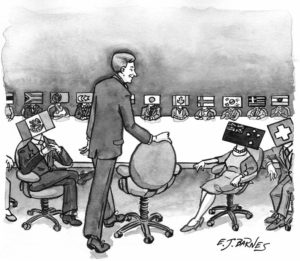Advocating Change
 by Roz Thomsen, Partner, Thomsen and Burke LLP
by Roz Thomsen, Partner, Thomsen and Burke LLP
Introduction
Don’t like the law? Change it! There are four principal targets of opportunity to change the export control and economic sanctions laws and regulations. Thomsen and Burke and its clients have enjoyed success with all of them.
U.S. Regulations
The Departments of Commerce, State and Treasury amend the export control and economic sanctions regulations on a regular basis, in order to account for changes in the political environment, the relentless advance of technology, and other factors. Of course, some changes are more significant than others. We have been closely involved in two of the most important changes in the last several decades.
The transfer jurisdiction to control cryptography from the International Traffic in Arms Regulations to the Export Administration Regulations arguably was the most important change affecting the Information Technology industry in the last half century. We founded the Alliance for Network Security specifically to provide a voice for the Information Technology industry in this debate. ANS continues to engage in dialog with the Commerce Department, the National Security Agency, and other interested agencies involved in the regulation of cryptography, urging periodic changes to reflect new developments in the field.
The “QRS-11 Gyrochip” controversy arguably was the most confounding issue faced by the aerospace industry in the last quarter century. We represented the manufacturer of the QRS-11 Gyrochip in the negotiations with the Departments of State and Commerce, which lead to the split in jurisdiction between the U.S. Munitions List and the Commerce Control List. The QRS-11 regulations were an important harbinger of the Export Control Reform initiative, ultimately resulting in the creation of the Commerce Munitions List.
U.S. Legislation
Congress has not undertaken a comprehensive review of export controls or economic sanctions legislation since the 1970s. However, Congress has considered specific amendments to the relevant statutes, some of which we have organized our clients to support because they would be beneficial, and others which we have organized our clients to oppose because they would be detrimental.
Lost sales to foreign competitors led to enactment of so-called “Foreign Availability” amendments to the Export Administration Act. Under this provision, the President must remove national security and foreign policy export controls on an item if it is available from sources outside the United States in comparable quality and sufficient quantity such that export controls are ineffective. Thomsen and Burke worked with Industry trade associations to enact this legislation, and we worked on not only the first, but also the most recent findings of Foreign Availability, leading to the decontrol of silicon wafer saws and semiconductor etching equipment, respectively.
On the other hand, in 2011, Representative Chris Smith (R-NJ-04) introduced H.R. 3605, the Global Online Freedom Act of 2011 (“GOFA”). GOFA would have amended the Export Administration Act by directing the Secretary of Commerce to: (1) establish a list of goods and technology that would assist a foreign government in acquiring the capability to carry out censorship, surveillance, or any other related activity through means of telecommunications, including the Internet; and (2) prohibit the export of listed goods or technology to a government end user in any Internet-restricting country. ANS members, among other interested parties, provided valuable input regarding problems with the approach proposed in GOFA, with the result that it did not pass.
Multilateral Export Controls
The United States and 40 other countries maintain export controls on a common list of items under the rubric of the Wassenaar Arrangement. As counsel to the electronic design automation (EDA) software industry, we have participated twice on the U.S. Experts Group Delegation to the Wassenaar Arrangement, in order to clarify the existing export controls on EDA software and to obtain an exemption from control where encryption is used to protect Intellection Property developed using EDA software.
We also have initiated proposals on numerous occasions that have been adopted by the U.S., and, ultimately by the participating member states of the Wassenaar Arrangement. The decontrol of products that use encryption only for operation, administration and management functions is one recent example of a proposal, initiated by the Alliance for Network Security.
Foreign Import Controls
We also have met with government regulators in Russia, China and India to discuss their trade policies with respect to cryptography. Under the auspices of the United States Trade Representative, we participated in multiple delegations that met with the Russian government during the negotiations leading to Russia’s ascension to the World Trade Organization. We have met with the Chinese State Encryption Management Bureau in connection with its Decree 273, as well as with the Indian government authorities that are engaged in the development of cryptography policy and legislation.
Conclusion
Changing the export control and economic sanctions laws and regulations can be done at the national and at the international level. Indeed, industry has a vital role in keeping the laws and regulations current, particularly in fast moving fields like Information Technology, aerospace and life sciences.
Disclaimer: This document may be considered Attorney Advertising. It is provided for informational purposes only and is not to be considered legal advice. Its distribution does not establish an attorney-client relationship. Each situation is unique and the techniques used will differ depending on the facts and circumstances. Therefore, this document does not describe the work that may performed in any particular matter.


